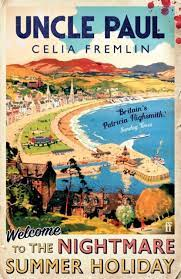James Barlow was an interesting and capable author whose work occasionally veered into the crime genre. Two of his books were filmed but since his death in 1973, aged just 51, his reputation has faded. I read Term of Trial when working on Lessons in Crime and was struck by the fact that it was published in 1961, just two years after Agatha Christie's well-known public school story Cat Among the Pigeons, but it could hardly have been more different. The novel was written when 'kitchen sink realism' was the flavour of the times and it's very much in that vein. So, yes, the mood is drab, but no, it's not a book to avoid.
Barlow was a very capable writer, although he has a disconcerting habit of making sudden switches of viewpoint within a scene. This is an authorial tic that I don't care for - there are times when it can be justified, but it's often a sign of carelessness. On the whole, however, this is a very well-made novel - and it's set in a secondary modern school. Since my mother taught in such a school for many years, and my oldest friend attended one, I do know quite a bit about what they were like. They've had a very bad press down the years, but often from people who never went inside one - as I did, many times. I don't know if Barlow ever taught in a secondary modern, but my copy is inscribed by him to a 'Fellow Master of the Resistance!', which perhaps suggests that he did.
Graham Wier has recently arrived at a new school, but remains haunted by an act of cowardice during the Second World War. I think most readers of today, including myself, wouldn't regard his behaviour then as cowardly, but times were different then. And that's a point that I kept reminding myself of as I read with some disbelief about Wier's relationship with an attractive female pupil. To say that he was naive is an understatement and despite the air of realism there are some incidents that tested my suspension of disbelief.
However, the quality of the characterisation kept me reading. There is a trial scene towards the end of the book and although the storyline is relentlessly downbeat, I was glad I read it. The book enjoyed success in its day and it was filmed not long after publication with a truly dazzling cast: Laurence Olivier, Simone Signoret, Sarah Miles, Terence Stamp, Hugh Griffith, Roland Culver, Thora Hird, Allan Cuthbertson etc etc. Overall, I'd say the book is a very interesting social document - though in its way, it's as dated as Cat Among the Pigeons.




.JPEG)
.JPEG)
.JPEG)
.JPEG)

.JPEG)
.JPEG)

.JPEG)
.JPEG)
.JPEG)
.JPEG)
.JPEG)
.JPEG)
.JPEG)
.JPEG)
.JPEG)
.JPEG)
.JPEG)

.JPEG)
.JPEG)
.JPEG)















